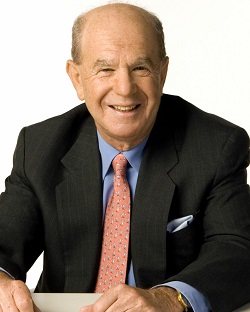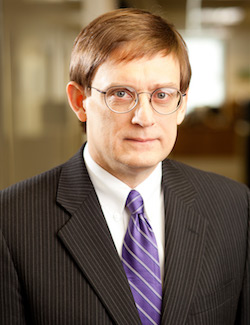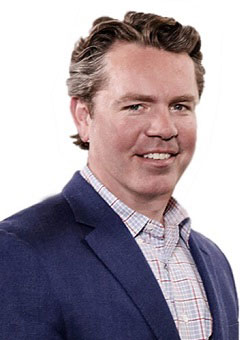Transcripts
 Erik: Joining me next on the program is Professor Edward Altman from the NYU Stern School of Business. Dr. Altman is perhaps best known for the Z-Score measure of credit, which we’ll discuss in this interview.
Erik: Joining me next on the program is Professor Edward Altman from the NYU Stern School of Business. Dr. Altman is perhaps best known for the Z-Score measure of credit, which we’ll discuss in this interview.
Before we get started, though, Dr. Altman provided a fantastic slide deck. Listeners, you will find the link to that slide deck in your Research Roundup email. If you’re not yet registered, just go to macrovoices.com, look for the red button next to Dr. Altman’s picture that says “Looking For The Downloads.”
Dr. Altman, I’d like to start with the really big picture. So many people in finance have said, okay, that’s it, the secular bull market is over. The secular bear market is on. Once we break 3.10 on the 10-year, baby, it’s all over after that. Yields will never go lower. The market’s headed straight down in terms of price.
And, of course, what we’ve been seeing in the last several weeks is the exact opposite. So what’s going on here? Where are we in the cycle? Are we really at the beginning of a new cycle or the end of an old cycle? And, if not, where are we in the cycle? And what are the signs we should be looking for to tell us whether and when it’s ending?
 Erik: Joining me next is JDI Research founder Juliette Declercq. Juliette has prepared another of her fantastic chart books for us so be sure, listeners, to download it. You can find the download link in your Research Roundup email. If you’re not registered yet, just go to macrovoices.com, look for Juliette’s picture on our home page, and the red button that says “Looking for the Downloads” next to her picture.
Erik: Joining me next is JDI Research founder Juliette Declercq. Juliette has prepared another of her fantastic chart books for us so be sure, listeners, to download it. You can find the download link in your Research Roundup email. If you’re not registered yet, just go to macrovoices.com, look for Juliette’s picture on our home page, and the red button that says “Looking for the Downloads” next to her picture.
Juliette, you have had a grim outlook on global activity since January of this year. And you’ve successfully translated that into substantial profits for your clients this summer. My question now, though is: Is the Trump/Xi agreement from the G20 a game change, as so many people seem to think it is?
 Erik: Joining me next on the program is MI2 founder, Julian Brigden. Julian has been one of our most prescient guests. A lot of his calls on the fixed income markets in particular have been incredibly accurate. And it’s so timely to get him back on the program as everyone is wondering, okay, what’s going on with 10-year Treasury yields? Are we really headed much higher from here? Or are we seeing what actually might be the beginning of a major retracement downward in yields?
Erik: Joining me next on the program is MI2 founder, Julian Brigden. Julian has been one of our most prescient guests. A lot of his calls on the fixed income markets in particular have been incredibly accurate. And it’s so timely to get him back on the program as everyone is wondering, okay, what’s going on with 10-year Treasury yields? Are we really headed much higher from here? Or are we seeing what actually might be the beginning of a major retracement downward in yields?
Julian put a fantastic chart book together. Registered users will find the download link in your Research Roundup email. If you’re not registered yet, just go to our home page at macrovoices.com. Look for the red button that says “Looking For The Download” next to Julian’s picture.
Julian, before I get into specific questions, let’s start with the really big picture of what drives the fixed income markets. What is the big picture driver of yields that you look at? And how does that play into your overall thesis that you’ve described to us in past interviews? And what are you seeing now in this market?
Julian: We have been very adamant, and we got lucky at calling the lows back in July of 2016 – as yields were around 1.35%, 1.36% – in saying that we thought the low was in in Treasury yields. And I mean the low. And one of the reasons for that, Erik, is that I think people frequently misinterpret the bigger picture.
The bigger picture is really set, to a large extent, by demographics. And I think a lot of people draw inferences to Japan and say, look, 10-year Treasury yields have to go toward 10-year JGB yields. To me, that’s wrong for a couple of reasons.
Firstly, Japan is a little unusual. It eats what it kills. So it does fund its own deficit. The United States is a little different. It actually relies on overseas funding of deficits.
 Erik: Joining me next the program is CPM Group founder Jeffrey Christian, very well known as a precious metals expert.
Erik: Joining me next the program is CPM Group founder Jeffrey Christian, very well known as a precious metals expert.
Jeff, I want to start with this story in gold. I’ve been watching this market for months and months. It seemed to me like there wasn’t a whole lot of a story to tell. It was inverse of the dollar, as you would expect.
But then, on October 11, we saw gold and the dollar move up on the same day and they moved up big in both the dollar and gold. I think that’s perplexed a lot of people. A whole bunch of conspiracy theorists said, okay, that means that the secret Chinese manipulation is over and we’re about to go to $2,000.
But a couple of weeks went by and things have settled down. We’re starting to trade lower again. So do you have any explanation of what changed around the 11th of October? And how that’s played into markets?
 Erik: Joining me next is Hedgeye founder Keith McCullough.
Erik: Joining me next is Hedgeye founder Keith McCullough.
Keith, it’s been a year – I can’t believe it – since we had you on the program. Last time that you were on, I think that you were very much bullish real growth and there were a lot of naysayers saying the market was headed lower. You were adamant, and you were proven right.
Now things have changed and we actually got a little bit of a heads up from your colleague Darius Dale when we had him on the program. He said, hmm, we are not firmly bullish anymore. We’re starting to think twice.
As I look at Slide 5 in your deck, it looks like you guys have moved into the fourth quad. So talk about the four quads, why you use them in your process. But, particularly, how did we end up here underneath the neutral line in the fourth quad? And where is it headed.
Keith: I appreciate you recapping that Erik, because being a bull or a bear permanently is no permanent position to take. And, really, we’ve built the process, or I have, over the course of the last long while trying to use the two most causal things that change markets, which are the rates of change and growth in inflation to get ahead of any change from bullish to bearish or bearish to bullish.
MACRO VOICES is presented for informational and entertainment purposes only. The information presented in MACRO VOICES should NOT be construed as investment advice. Always consult a licensed investment professional before making important investment decisions. The opinions expressed on MACRO VOICES are those of the participants. MACRO VOICES, its producers, and hosts Erik Townsend and Patrick Ceresna shall NOT be liable for losses resulting from investment decisions based on information or viewpoints presented on MACRO VOICES.
